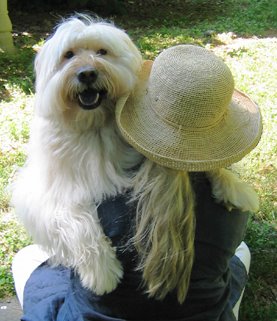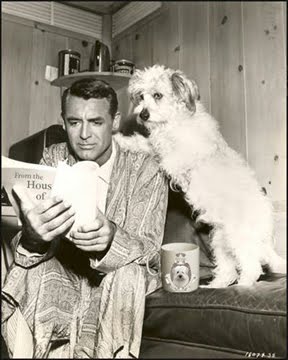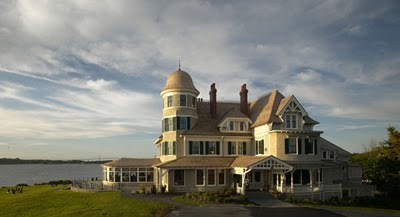The Intruder
The chaise lounge that sits in my bedroom is covered in stars. Woven into the red tapestry, this fanciful constellation calls out to me on a dreary afternoon, beckoning me to “Come, Sit Awhile, Have a Daydream”. I cannot resist. With the April sun hiding behind thunderclouds of grey, a brisk wind plays through the chimes that hang round my open window like spring icicles, their sound a bit muffled now that the rose bush is in bloom. I plump up the pillows behind my head and crack open my book. No new best seller, no trendy tome. No, this is the perfect day for climbing that winding drive up through the dark wood, past the wall of blood-red rhododendrons, on round the corner where the sea can be heard, crashing on the rocks far down below the garden.
I am on my way to Manderley again.
I am rereading Rebecca.
Perhaps he will not appear this time, choosing instead to remain in his place, deep in the shadows of the black and white world to which he so rightfully belongs. But just as I read of his fated arrival in that dining room in the Monte Carlo hotel, there he is. I can see him now clearly, sitting just across the room in my tufted leather porter’s chair, with his suede clad feet casually resting on my Indian ottoman, the smoke curling up from his pipe, and a faint furrow of worry etched across his handsome brow, just visible over the top of his newspaper. Maxim de Winter, as played by Sir Laurence Olivier. And once again, I am reminded. Always, always read the book first.
Rebecca was one of my mother’s favourite movies and therefore I saw it with her on television long before I was fortunate enough to read Daphne du Maurier’s atmospheric prose for myself. So naturally, when I finally got around to opening the book, there he was, Sir Laurence, on every page. I could not get him out of my mind. Not that that’s such a bad thing, exactly, for he did play the part extremely well. But rarely does a film match the unique images one sees in one’s head when reading a book. Everything about the character, from their pattern of speech, to that mysterious look in their eye, or the way their hair ruffles in the wind - on the very first reading each individuality appears for you and you alone, complete, and never to depart. Pick up a beloved book years later, open it up, and there they’ll all be, those well-known characters, wandering around in the rooms you remember, where the autumn sunlight falls on the patterned carpet just so, and one lone rose petal drifts down from that vase on the piano, softly hitting a key like the whispered sound of a bell.
But be aware, see a film before a book, and so often, try as you might, you cannot stop the actors from striding onto the stage of your imagination with an arrogant sense of entitlement towards the characters they have portrayed. Close your eyes, grit your teeth, they remain, and no doubt it is a testament to their prodigious acting skills that they do.
For those of us who saw the movies before we read the books, is it possible to pick up a copy of Gone With The Wind and not see the lovely face of Vivien Leigh? Can Breakfast At Tiffany’s stand alone, without the irresistible presence of Audrey Hepburn traipsing along through its pages? So intertwined are these actresses with their literary counterparts they are almost woven into the very fibers of the books from whence they sprung. Conversely, whenever I reread Wuthering Heights, try as he might, Lord Olivier has no effect on me whatsoever. Having been fortunate enough to have read the book before I ever saw the film, my Heathcliff remains true to my original vision, his wild face one only I can see. It matters not how brilliant Olivier was in the film version. My imagination is untouched.
I’m not saying books should never be turned into film. Just that books are generally always superior. Read them first, give your imagination a chance. Then enjoy the movie. Of course, I suppose there are worse things that spending an afternoon with Sir Laurence.
But I swear, if Joan Fontaine shows up, I’m off to do the laundry.
















































